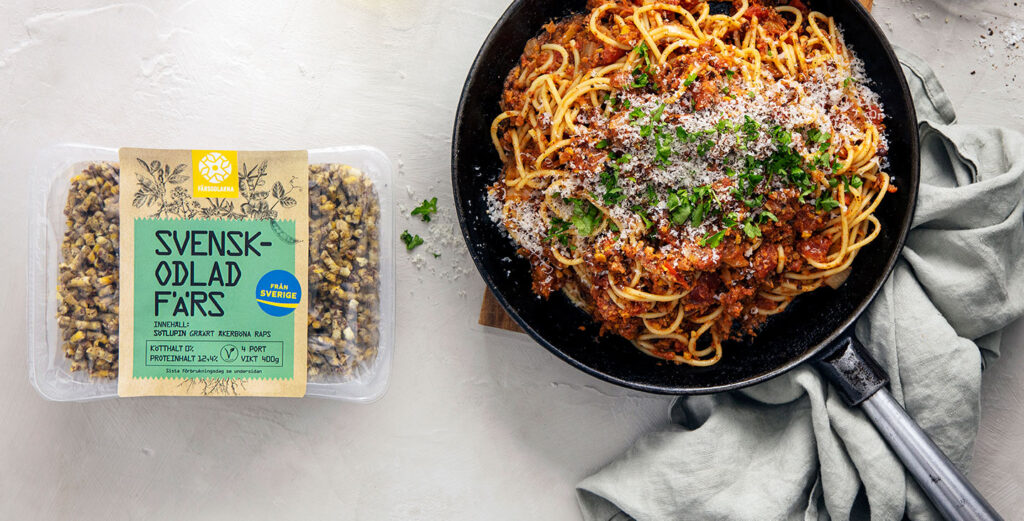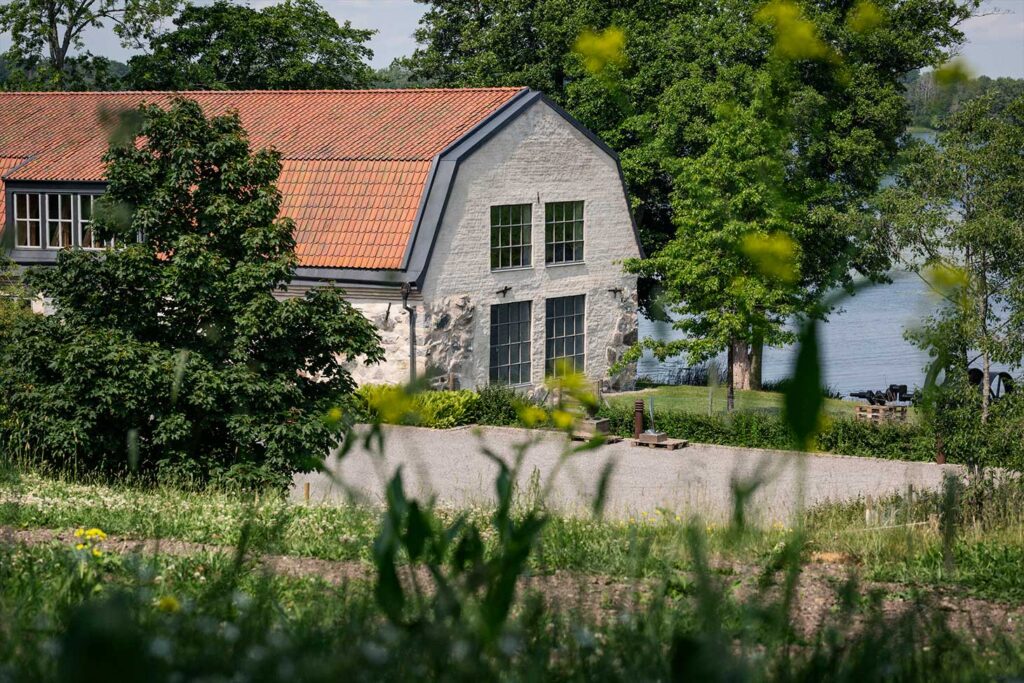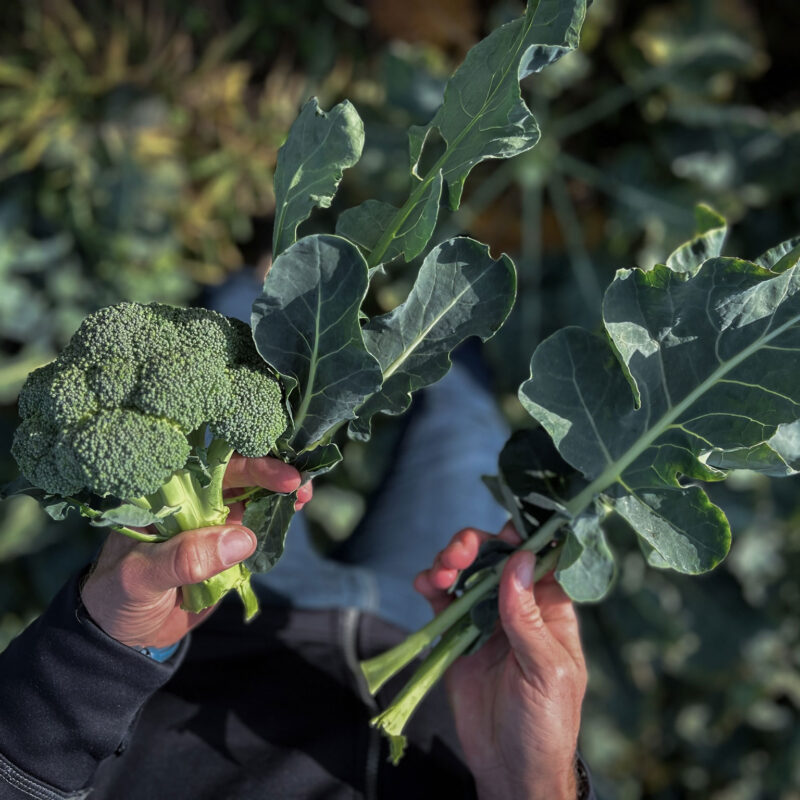Axfoundation’s award-winning Swedish Minced Legumes taken to wider market by pioneering startup Färsodlarna
2021.02.23

The non-profit sustainability organization Axfoundation hands over further scaling and continued commercialization of its legume mince to the newly started company Färsodlarna. The award-winning locally produced product made from Swedish sweet lupines, grey peas and broad beans is an innovation on market for plant-based protein, today dominated by products based on imported soy.
“Axfoundation’s ambition with the development of a mince product made entirely of Swedish raw ingredients was to contribute to increased demand for Swedish legumes while also contributing to reduce the consumption of unsustainably produced meat. We have proven that it is possible and now it is time to pass the baton to a commercial player who can take the mince further, into even more Swedish kitchens”, says Madeleine Linins Mörner, Program Director of Future Food at Axfoundation.
The concept of Swedish legume mince was born at Torsåker farm, Axfoundation’s test farm and development center located outside Upplands Väsby in Stockholm, Sweden. Together with chefs, farmers and representatives of the grocery trade, Axfoundation developed the innovation from pea to finished product. The result was a mince made entirely from Swedish ingredients and without soy, a crop associated with substantial negative environmental and climate impact. In the past year, the Swedish mince has gained ground and shelf-space, with increased volumes in both food retail and food service.
The success of Swedish legume mince attracted attention and, in 2020, Axfoundation was awarded the Sustainability Initiative of the Year award for its work on developing Future Food. As a way of enabling further scaling to reach a wider market, non-profit organization Axfoundation is leaving continued commercialization to the newly started company Svenska Färsodlarna.

Torsåker farm, Axfoundation's test farm and development center
“We are extremely proud to take over the ownership of this unique innovation. Our goal at Svenska Färsodlarna is to give people access to fantastic, tasty, plant-based food that is easy to prepare. This way, we make it easy to reduce climate footprints. Our first product is Svenskodlad Färs, which will be launched to the grocery trade in mid-March,” says Oddgeir Hole, CEO at Svenska Färsodlarna.
The inhabitants of Sweden eat an average of 700 grams of red meat each week. As part of a healthy diet, within the planetary boundaries, consumption should be reduced to 0-200 grams, according to the researchers behind the EAT Lancet report. A tenfold increase in the consumption of legumes is also necessary. The market for plant-based alternatives is growing strongly in Sweden, yet the proportion of protein products consisting of Swedish raw ingredients has been relatively low to date. Instead, the market is dominated by imported soy, a crop often associated with a high environmental and climate impact. Many consumers have signaled that they want to eat right but find it difficult to make sustainable choices from the products available on store shelves.
“We know that change is a challenge. This is why we wanted to make it easier for families to find a sustainable and nutritious alternative to minced meat – the meat we eat most of in Sweden. The result is a mince that contains Swedish sweet lupines, gray peas, broad beans, residues from rapeseed oil production, and a little salt. That’s it,” says Madeleine Linins Mörner.
According to Maria Smith, Secretary General at Axfoundation, the transition to a commercial partner is a natural part of Axfoundation’s working model.
“Axfoundation’s strength lies in identifying the challenges together with the entire value chain, developing a practical solution, and proving that the business model works. Then, as a non-profit organization, we hand over further upscaling. Now is the time to take on new challenges within future food, but also in the areas of circular economy and sustainable production and consumption,” she says.
Swedish legume mince will be sold by Svenska Färsodlarna under the brand Svenskodlad Färs to consumers, and Svensk Baljväxtfärs to the food service industry via Grönsakshallen Sorunda and Martin & Servera.
Facts about Swedish meat consumption and plant-based protein:
- The market for plant-based protein products has grown by nearly 16 percent per year over the past three years. (Macklean)
- The proportion of Swedish raw ingredients in the plant-based protein products available on the market is overshadowed by imported soy. (Macklean)
- Swedish legume mince consists of Swedish sweet lupines, gray peas, broad beans, residues from rapeseed oil production, and a little salt.
- Just 2 percent of all arable land in Sweden is used for legumes. 80 percent of Swedish legume production goes to feed, 3 percent of the harvest ends up on Swedish dinner tables. (Jordbruksverket)
- Inhabitants of Sweden eat nearly 70 percent more meat today than 60 years ago, although a reduction has been seen during the last three years. (Naturvårdsverket)
- In Sweden, an average of 700 grams of red meat (raw weight of beef, pork, lamb) is consumed each week. (Jordbruksverket)
- The EAT Lancet report recommends 0-200 grams of red meat per week to eat a healthy diet within the planet’s boundaries. At the same time, a tenfold increase in legume consumption is recommended. (EAT Lancet)

Contact
- Madeleine Linins Mörner, Programansvarig Framtidens mat, Axfoundation,
, +46 (0)70 950 35 35 - Maria Smith, Generalsekreterare, Axfoundation,
, +46 (0)76 145 28 20 - Oddgeir Hole, VD, Färsodlarna,
, +46 (0)76 849 81 01

























































